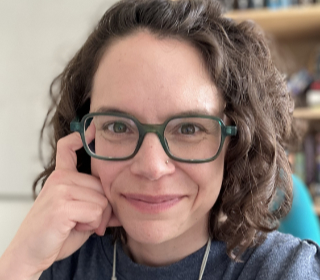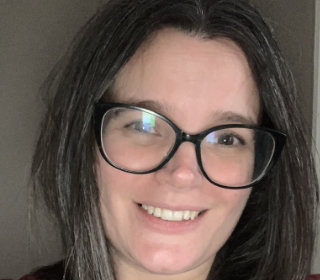If you'd like to find out more about our Master's in Literature for Children and Young Adults, contact Leah Phillips on lphillips@marjon.ac.uk
MA Literature for Children and Young Adults
On the MA in Literature for children and young adults, you will explore some of the most powerful and captivating stories of our time. You’ll develop the skills and knowledge to excel in professions like education, library services, youth and community service, and children’s media.

Any questions about postgraduate study at Marjon?
Contact Rachel Bailey-Lewis, our Student Recruitment Officer (Postgraduate).
Course Summary
Do you have a passion for children’s and young adults’ literature? Do you wish to explore how authors and selected literature promote both reading and engagement in issues such as community, identity, inclusion, the environment, climate change, mental health & well-being? Do you wish to produce your own creative writing for children or young adults? If so, then this is the course for you.
You'll learn through a blend of digital learning including online talks, lectures and readings by authors such as Philip Pullman, Katherine Rundell, Michael Morpurgo, Naomi Shihab Nye and others, and on-campus learning such as lectures, seminars and tutorials. You will explore how children’s literature has developed since the nineteenth century into an exciting, imaginative, contemporary mix of genres including the historical and adventure novel, graphic literature, fantasy and sci-fi, drama, poetry, picturebooks, film, theatre and digital ‘imagineering’, etc.
You will develop high-level skills in enquiry & critical appraisal and pursue your own author & genre-focused interests through a range of written assessments, in addition to producing your own portfolio of creative writing.
You will read very widely throughout the course – pre-course reading lists encourage you to dip your toes into the vast landscape of children’s and young adults’ literature. Through close studies of chosen books you will interrogate the relationship/s between authors, illustrators, readers, texts and contexts.
Why this course at Marjon?
Part-time study option lets you study alongside work
Opportunities to explore and research your own author and genre interests
Produce original creative writing for children and young adults
A culture of shared peer learning – to extend your knowledge of authors and genres
Gain new insights into the challenges wrought by Covid on children, families and communities and explore the ‘restorative’ potential of children’s and young adults’ literature
Use an eco-critical lens’ to explore the relationship(s) between text, reader and engagement in environmental and climate issues
Modules for this course
1st Year
Turning the page: an examination of the development of literature for children and young adults
Opening stories: genres and themes in literature for children and young adults
Research design
Creative writing for children and young adults
Research dissertation OR creative writing dissertation
Current students say...
Tom Mallender
“The beauty of this course is that it is student-led, which allows you to develop your own literary and research interests. I have creative freedom to craft my own writing, I am currently researching the extent to which David Walliams is being positioned as the ‘new’ Roald Dahl and I am looking forward to producing my own original creative writing. I intend to train as an English teacher, and this course will be invaluable in terms of informing and developing my own teaching philosophy.”
Keiran Moon
“The freedom to explore the aspects of literature that resonate with me has kept me constantly engaged, whilst the tutorials are invaluable in helping me contextualise and explore other sub-genres and authors. The amount of support you get at Marjon means that it is impossible not to develop academically. I have additional needs and see a study tutor and mentor every week which has helped me settle quickly. My tutor has been fantastic and given more support than I would ever have imagined.”
This course is perfect if you’re curious about
The themes which inform the writing of children’s and young adults’ literature
The reading or writing of Children's and Young Adults' literature
What makes a children's book successful
The crafting frameworks which support production of original creative writing
How narrative contributes to ideological constructions of society
How to encourage reading for enjoyment and learning
“ The programme is very attractive, especially the inclusion of Young Adult within the title which had made the programme more distinct from that offered elsewhere and should not only attract undergraduates from a variety of programmes but also applicants working in the fields of publishing and journalism.”
What might you become?
Many of our students are teachers, choosing to take their knowledge and learning into the classroom to develop and enhance reading for pleasure. Other students are librarians, education leaders, parents, actors, community arts workers and writers, all of whom plan to use their new-found knowledge to promote reading and wider learning. Perhaps you will be among them – read Tom’s and Keiran’s stories and be inspired.
Graduates have chosen to progress their careers in community & family learning, pupil support, acting & performance, teaching.
How you’ll be taught and assessed?
How will you be taught?
Learning and teaching methods will be varied and flexible meeting the needs of the course participants, and include workshops, lectures, conferences, visiting writers, digital learning and supported independent study.
How will you be assessed?
Students submit work for marking, moderation and external examination. A range of assessment types exist in the modules, including a dissertation, portfolios, presentations, creative writing, essays, reflective studies or practice based study.

Leah is a specialist in children’s and young adult literature. At Marjon, she is a Senior Lecturer in the School of Arts, Humanities and Social Sciences. In this role, she is Programme Lead for both English BA (Hons) and Literature for Children and Young Adults MA. Her research focuses on representations of adolescent girlhood in YA speculative fiction. She’s interested in girl heroes who break boundaries, blur borders, and challenge what it means to be a ‘hero’ according to mainstream, patriarchal views and values. Her book, Female Heroes in Young Adult Fantasy Fiction: Reframing Myths of Adolescent Girlhood, will be out later this year. In it, she talks about how damaging Cinderella’s narrow and limiting heightened fantasy femininity is to girls and women and how a cross-dresser, cyborg, and shape-shifter, as examples, offer a much more representational and inclusive model of selfhood. Leah is also the President and Founder of the YA Studies Association, an international organisation existing to increase the knowledge of, and research on, YA literature, media, and related fields. She serves on the Children’s Literature Association’s Phoenix Committee and is on the Editorial Board of the International Journal of Young Adult Literature.
Fees and funding
Fees UK students: £8,000 per annum
Fees for International students: £14,500 per annum
This fee covers your tuition and access to course-specific equipment and facilities, as well associated services including access to the library, study skills support, IT support, student support and wellbeing services and membership of the Student Union. There may be additional costs by course.
Funding available for this course
Our Student Funding Advisors offer confidential and impartial advice about your funding options.
Learn moreYour schedule
Full-time and part-time students are required to join formal lectures and wider blended learning every Thursday over a 3-semester academic structure (Sept-January, January-May, May-July). The rest of students’ time is spent in individual, tutor-supported research, pursuing their own authorial & genre interests, preparing writing for peer appraisal, 1:1 tutorials, seminars, etc.
Course location(s):
Plymouth Marjon University
Lecturers

Selina Day is a qualified teacher who has extensive experience working within the primary sector. She is the programme lead for BA Primary Education and lecturers within the Institute of Education and School of Arts and Humanities. At the university she is involved in various activities that sit outside her programme and school responsibilities. She is member of SCION (Sustainability, Creativity and Innovation) research group and has been a chair of governors at a local Plymouth school. Currently Selina is a member of the First Federation Academy Trust. As well as her academic role at the university, she is undertaking her PhD in the area Contemporary Children’s Literature and Religious Education.

Leah is a Senior Lecturer in the School of Arts, Humanities and Social Sciences and the Programme Lead for the BA English and the MA Literature for Children and Young Adults.
Her research broadly focuses on how YA fiction impacts its readers’ lives, especially marginalised individuals and groups. Leah recently finished revisions on her first monograph, Female Heroes in Young Adult Fantasy Fiction: Reframing Myths of Adolescent Girlhood.
Away from the university, Leah undertakes a range of work in children’s literature and YA studies. In 2020, she founded the YA Studies Association (YASA), an international organisation existing to increase the knowledge of and research on YA literature, media, and related fields.




